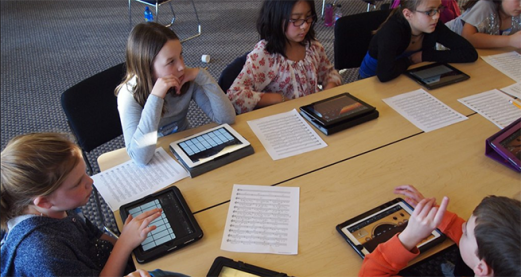Over a half term at Oakgrove School, English teacher Meera Chudasama collaborated with Dr Cindy Kerawalla – a Senior Lecturer in Childhood and Youth Studies at The Open University – on some research using Talk Factory in her lessons in January and February 2019. Talk Factory is an online tool and app which supports learning by helping teachers and their students to understand how to engage in productive argumentation in primary and secondary schools. This is an important aspect of education described in the English National Curriculum (2014) as follows:
“Pupils should be taught to speak clearly and convey ideas confidently using Standard English. They should learn to justify ideas with reasons; ask questions to check understanding; develop vocabulary and build knowledge; negotiate; evaluate and build on the ideas of others; and select the appropriate register for effective communication”.
Talk Factory has been used on the interactive whiteboard in many primary and secondary schools to support science, geography and maths lessons. This time, they used the app on iPads as well, and going outside for some lessons. Meera used Talk Factory in a non-fiction scheme of work, named ‘voices of our generation’ to help students to convey and justify their own opinions, and question the opinions of others, on topics such as ‘social media’ and ‘education’. Talk Factory was also used on the interactive whiteboard to support whole class discussions, and the app was used on iPads, by students, during group discussions and during an exciting outdoor activity in the school grounds. This was done to answer two research questions:
‘What are young people’s experiences of using Talk Factory across indoor and outdoor spaces?’
‘How can young people be facilitated to share their Talk Factory stories?’
Cindy video-recorded lessons and followed the experiences of a case-study group of four students who took photos of their Talk Factory experiences and partook in interviews about why the content of their photos is important to them.
From a teacher’s perspective!
By Meera Chudasama
As a teacher, seeing Talk Factory in action has been difficult, yet encouraging. Mainly because, in many classroom contexts the teacher leads class discussions - while I have always thought of myself as a ‘facilitator’, with this Year 7 class I felt I was affirming the voices of students and not providing them with the space to explore each other’s ideas. TalkFactory made me aware of how I was constructing spaces for student talk and the role I could play in this self-supporting community that uses exploratory talk to share experiences.
At times, the way we teach with texts can cut-off students from texts, from the subject of English and from school. By ‘cut-off’ I feel students learn our (the teachers) interpretation of texts which hinders them exploring their own. The constraints of the examination process and the privileging of a particular kind of ‘literary critical, analytical’ language cuts off students from their own responses, reflections and creativity. Furthermore, the influence of the current curriculum prioritises the assessment of memory recall as opposed to seeing the ways students take part in ‘meaning making processes’. In regards to the impact on talk in the classroom, at times when teachers believe they are leading a discussion, the teacher can suggest the ‘correct’ interpretation which shapes discussions in the classroom. I therefore wanted to explore non-fiction literature in the scheme of learning titled Voices of Our Generation.
Interestingly, I read Suzanne Miller’s work on How Literature Discussions Shapes Thinking: ZPD for Teaching/Learning Habits of the Heart and Mind, her observations of teachers using classroom discussion showed to bring both opportunities and hindrances to ‘open-forum classroom discussions’. By this, I mean, Miller critiques that in ‘many classroom contexts, literature discussions cut-off students from their own responses… even teachers who believe they are holding “discussions” they insist on their own “correct” interpretation’ (ibid). From this, I see how teachers push forward their own interpretations and deem it to be correct; I also query my own questioning of students when engaging in class discussions; am I steering their perspectives to fit my own and to pass exams or am I helping them to develop their own?

For me, TalkFactory has prioritised these ‘meaning making processes’ as the use of the software gives students the opportunity to have ‘open-forum discussions’. These ‘processes’ and ‘discussions’ started as whole class discussions. Later, using iPads for group discussions, where students listen and evaluate their ‘talk’. What I mean by ‘meaning-making processes’ is that students are no longer looking for me to affirm their opinions, rather students have started to explore each other’s ideas, disagree with each other and have even noticed patterns in their own talk.
In light of these discussions, Cindy and I are interested in how outdoor spaces play a role in teaching and learning. Interestingly, TalkFactory played a key role in transporting this classroom community outside. When asking students to access and think of ‘where and how learning could take place?’ I took students around the school: in groups of four with iPads to host TalkFactory and a piece paper to note down the groups’ thoughts and ideas. In this activity, I was interested to see how students transported these ‘meaning making processes’ outside, away from the structure of a ‘classroom lesson’.
This is just the beginning of our research journey with Talk Factory. If you want to use Talk Factory, you can access it for free.
- The online version (for IWBs) is: http://talkfactory.uk/
- The iPhone/iPad app is free from the Apple app store.
- There is an android app for free in Google Play.
If you would like to discuss using Talk Factory in your class, please contact cindy.kerawalla@open.ac.uk or mchudasama@oakgrove.school (@innovatejournal)




Rate and Review
Rate this article
Review this article
Log into OpenLearn to leave reviews and join in the conversation.
Article reviews